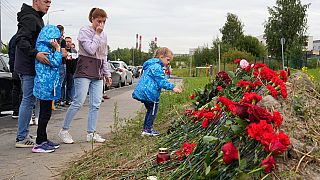“It’s an absolute lie,” said Kremlin spokesman Dmitry Peskov on Friday, denying allegations from Western officials that Putin orchestrated the incident.
“We must approach this problem based on facts,” he added.
A private jet reportedly carrying 10 people, including several senior figures within the Russian Wagner group, crashed north of Moscow on Wednesday evening.
Speculation is rife about what happened, with many in the West saying the plane was likely downed by Russian security services under the orders of the Russian president.
State media in Russia say the aircraft caught fire upon hitting the ground.
On Friday, the British Ministry of Defence said no “definitive proof” currently exists that Prigozhin was killed on Wednesday.
“There is not yet definitive proof that Prigozhin was onboard and he is known to exercise exceptional security measures,” it said. “However, it is highly likely that he is indeed dead.”
Question marks hang over what will now happen to Wagner.
The UK MoD claimed the “demise of Prigozhin would almost certainly have a deeply destabilising effect” on the force, citing his “hyperactivity”, “exceptional audacity”, “drive for results and extreme brutality”.
These are “unlikely to be matched by any successor”, it added.
Wagner field commander Dimiry Utkin and logistics chief Valry Chekalov are also presumed dead in the crash.
The Institute for the Study of War argue that Russian authorities likely moved against Prigozhin and his top associates as “the final step to eliminate Wagner as an independent organisation.”
Putin on Friday signed a decree requiring Wagner troops to take an oath to Russia, as regular army soldiers do.
Under this decree detailed on the government’s website, they must swear “fidelity” and “loyalty” to the state and “strictly follow the orders of commanders and superiors”.
‘Serious mistakes’
A preliminary US intelligence assessment concluded an intentional explosion downed the believed Wagner private jet, challenging press reports it was hit by a surface-to-air missile.
Prigozhin was “very likely” targeted and the explosion falls in line with Putin’s “long history of trying to silence his critics,” said US and Western officials in reference to the assessment.
Speaking on the condition of anonymity, they did not offer any details about what caused the explosion, which was widely believed to be vengeance for Wagner’s mutiny in June – something that posed the biggest challenge to the Russian president’s 23-year rule.
Putin praised the mercenary leader as a “talented man” on Thursday, after remaining silent about what had happened. He expressed his condolences to the families of those apparently aboard the jet and referred to “serious mistakes” by Prigozhin.
It was not clear why several high-ranking members of Wagner, including top leaders who are normally exceedingly careful about their security, were on the same flight. The purpose of their joint trip to St. Petersburg was unknown.
Several Russian social media channels reported the bodies were burned or disfigured beyond recognition and would need to be identified by DNA.
These reports were picked up by independent Russian media, but The Associated Press was not able to independently confirm them.
Speaking to Euronews on Thursday, Dr Stephen Hall, lecturer of Russian politics at the University of Bath, claimed the plane crash was a message.
“Putin sends signals to people,” he said. “I think this is quite a clear signal that this is what happens to traitors.”
Shortly after Prigozhin’s armed mutiny broke out on 24 June, the Russian leader denounced the rebellion as “treason” and a “stab in the back”, vowing to avenge it.
These charges against Prigozhin were soon dropped in a secretive deal that exiled the mercenary force to Belarus. But many speculated it would not be long before the Kremlin went after him.
“The war is going badly and some elites are dissatisfied. By killing Prigozhin it sends the signal that if you rise up then you’re going to have a very brutal end,” he continues.
Nationalist and patriotic groups in Russia have become increasingly more vocal about their government’s military campaign in Ukraine, often slamming them for mismanagement and botched battlefield manoeuvres.
Russian authorities have said the cause of the crash is under investigation.
Numerous opponents and critics of Putin have been killed or gravely sickened in apparent assassination attempts in the past.
“It is no coincidence that the whole world immediately looks at the Kremlin when a disgraced ex-confidant of Putin suddenly falls from the sky, two months after he attempted an uprising,” said German Foreign Minister Annalena Baerbock, while acknowledging that the facts were still unclear.
“We know this pattern … in Putin’s Russia – deaths and dubious suicides, falls from windows that all ultimately remain unexplained,” she added.
Abbas Gallyamov, a former speechwriter for Putin turned political consultant, said by carrying out the mutiny and remaining free, Prigozhin “shoved Putin’s face into the dirt in front of the whole world.”
Failing to punish Prigozhin would have offered an “open invitation for all potential rebels and troublemakers,” so Putin had to act, Gallyamov added.
